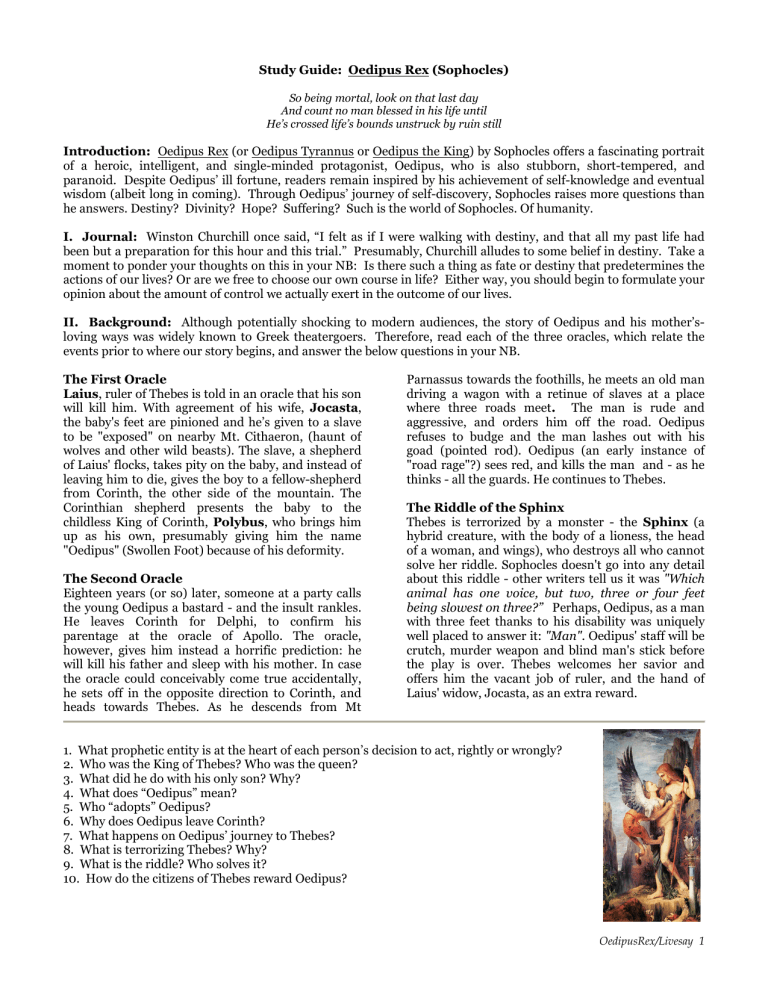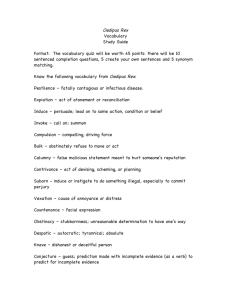Oedipus Rex SG

Study Guide: Oedipus Rex (Sophocles)
So being mortal, look on that last day
And count no man blessed in his life until
He’s crossed life’s bounds unstruck by ruin still
Introduction: Oedipus Rex (or Oedipus Tyrannus or Oedipus the King) by Sophocles offers a fascinating portrait of a heroic, intelligent, and single-minded protagonist, Oedipus, who is also stubborn, short-tempered, and paranoid. Despite Oedipus’ ill fortune, readers remain inspired by his achievement of self-knowledge and eventual wisdom (albeit long in coming). Through Oedipus’ journey of self-discovery, Sophocles raises more questions than he answers. Destiny? Divinity? Hope? Suffering? Such is the world of Sophocles. Of humanity.
I. Journal: Winston Churchill once said, “I felt as if I were walking with destiny, and that all my past life had been but a preparation for this hour and this trial.” Presumably, Churchill alludes to some belief in destiny. Take a moment to ponder your thoughts on this in your NB: Is there such a thing as fate or destiny that predetermines the actions of our lives? Or are we free to choose our own course in life? Either way, you should begin to formulate your opinion about the amount of control we actually exert in the outcome of our lives.
II. Background: Although potentially shocking to modern audiences, the story of Oedipus and his mother’sloving ways was widely known to Greek theatergoers. Therefore, read each of the three oracles, which relate the events prior to where our story begins, and answer the below questions in your NB.
The First Oracle
Laius , ruler of Thebes is told in an oracle that his son will kill him. With agreement of his wife, Jocasta , the baby's feet are pinioned and he’s given to a slave
Parnassus towards the foothills, he meets an old man driving a wagon with a retinue of slaves at a place where three roads meet . The man is rude and aggressive, and orders him off the road. Oedipus to be "exposed" on nearby Mt. Cithaeron, (haunt of wolves and other wild beasts). The slave, a shepherd of Laius' flocks, takes pity on the baby, and instead of leaving him to die, gives the boy to a fellow-shepherd from Corinth, the other side of the mountain. The
Corinthian shepherd presents the baby to the childless King of Corinth, Polybus , who brings him up as his own, presumably giving him the name refuses to budge and the man lashes out with his goad (pointed rod). Oedipus (an early instance of
"road rage"?) sees red, and kills the man and - as he thinks - all the guards. He continues to Thebes.
The Riddle of the Sphinx
Thebes is terrorized by a monster - the Sphinx (a hybrid creature, with the body of a lioness, the head
"Oedipus" (Swollen Foot) because of his deformity.
The Second Oracle
Eighteen years (or so) later, someone at a party calls the young Oedipus a bastard - and the insult rankles.
He leaves Corinth for Delphi, to confirm his parentage at the oracle of Apollo. The oracle, of a woman, and wings), who destroys all who cannot solve her riddle. Sophocles doesn't go into any detail about this riddle - other writers tell us it was "Which animal has one voice, but two, three or four feet being slowest on three?” Perhaps, Oedipus, as a man with three feet thanks to his disability was uniquely well placed to answer it: "Man" . Oedipus' staff will be however, gives him instead a horrific prediction: he will kill his father and sleep with his mother. In case the oracle could conceivably come true accidentally, he sets off in the opposite direction to Corinth, and heads towards Thebes. As he descends from Mt crutch, murder weapon and blind man's stick before the play is over. Thebes welcomes her savior and offers him the vacant job of ruler, and the hand of
Laius' widow, Jocasta, as an extra reward.
1. What prophetic entity is at the heart of each person’s decision to act, rightly or wrongly?
2. Who was the King of Thebes? Who was the queen?
3. What did he do with his only son? Why?
4. What does “Oedipus” mean?
5. Who “adopts” Oedipus?
6. Why does Oedipus leave Corinth?
7. What happens on Oedipus’ journey to Thebes?
8. What is terrorizing Thebes? Why?
9. What is the riddle? Who solves it?
10. How do the citizens of Thebes reward Oedipus?
OedipusRex/Livesay 1
III. Reading Questions:
Prologue
1. What does Oedipus want to know from the Elder?
2. According to the priest, what is happening throughout Thebes?
3. What does the priest want Oedipus to do?
4. Where and on what mission has Oedipus sent Creon?
5. According to Creon, why does Thebes suffer? (Hint: What unjust event has happened in the past?)
6. According to Creon, what is the problem in finding witnesses or getting to the root of the problem?
7. What is Oedipus' attitude about "break[ing] this plague"?
Ode of Entry
1. According to the Chorus, what are conditions in the city?
2. For what do they pray?
First Episode
1. What is ironic about Oedipus' claim that he is "stranger to the story"?
2. What penalties does Oedipus decree on the guilty party?
3. What is ironic about Oedipus' statement "his marriage bed my bed of seed"?
4. According to the chorus, what divine being knows the truth about who the killer is?
5. According to the chorus, who might be able to help discover the murderer's identity?
6. What are the rumors surrounding the murder/murderer?
7. How does Oedipus treat Tiresias at first?
8. What does Tiresias know?
9. How does Oedipus react?
10. What accusation does Oedipus hurl at Tiresias?
11. What is Tiresias response?
12. As the conversation continues, what happens to Oedipus' composure?
13. What does Tiresias accuse Oedipus of being "wrapped together in"? What is the sin (you know, but he doesn't)?
14. Explain Tiresias statement: "These very gibes you mouth at me will soon be hurled by every mouth at you."
15. Whom does Oedipus now accuse? What is his reasoning?
16. What seems to emerge as one of Oedipus' character flaws?
17. According to Tiresias, what will Oedipus discover today?
Second Choral Ode
1. How does the Chorus feel about the possibility of Oedipus' guilt?
2. Where/why might Tiresias (the prophet) be wrong?
Second Episode
1. How does Creon react to the accused charges against him?
2. How does Oedipus treat Creon?
3. How does Oedipus link Creon and Tiresias to the crime? Why?
4. What is Creon's argument against Oedipus’ accusations? Why does Creon not need to be King?
5. In his speech to Oedipus, what is important to Creon?
6. How does Jocasta soothe both men’s anger?
Choral Dialogue
1. What does the Chorus urge Oedipus to do?
2. What "evidence" does Jocasta, unknowingly reveal in her conversation with Oedipus?
3. What “evidence” does Oedipus unknowingly reveal in his speech?
4. Whom do Jocasta and Oedipus agree to summon the palace?
Third Choral Ode
1. According to the Chorus, what kind of man does “Heaven never trips to falls”?
2. To whom do they pray (Hint: a god)?
Third Episode
1. According to Jocasta, why can't Oedipus "gage the present from the past"?
2. What does she mean by "We are gone to pieces at the sight of whom the Steersman of the ship astray by fright"?
3. What seemingly "good news" does the messenger bring?
4. How did this person die? What is Oedipus’ reaction?
5. What is Jocasta's advice to Oedipus on how to deal with the second part of the oracle (sleeping with his mother)?
6. What tragic newsflash does the messenger give about Oedipus’ parents?
7. At what point does Jocasta know? What does she attempt to do?
8. Of what is Oedipus still clueless? What within him blinds him to this reality?
Fourth Choral Ode
1. What does the Chorus seem to celebrate prematurely?
OedipusRex/Livesay 2
Fourth Episode
1. What does the shepherd violently tell the messenger to do? Why?
2. At what point does Oedipus clue into the horrible tragedy that has unfolded before his eyes? How does he react?
Fifth Choral Ode
1. According to the Chorus, what is man’s pattern? What do they mean?
2. According to Creon, what catches us all in the end, and who sits in judgment?
Epilogue
1. What tragedy does the Official report? Explain the gruesome details.
2. What is Oedipus’ emotional and physical condition?
Choral Dialogue
1. What central question does the Chorus ask Oedipus about his actions?
2. What is Oedipus’ response (reasoning)?
3. Whom does Oedipus curse?
4. How does Creon say to treat Oedipus?
5. What does Oedipus ask Creon to for him? Jocasta? His children?
6. According to Oedipus, what will be the future woes for his children?
7. What special request does Oedipus ask of Creon concerning his children?
8. What final advice (and I-told-you-so) does Creon give Oedipus?
Envoi
1. Summarize and interpret the last lines of the play.
IV. Discussion Questions:
1. Discuss the importance of oracles to the ancient Greeks and specifically, to Oedipus Rex. Include a consideration about whether human actions are the result of predestination (Fate/Destiny) or free will. What does Sophocles seem to believe on this issue?
2. Discuss the concepts of guilt/justice as applied to the characters Oedipus, Jocasta, Laius, Creon, Tiresias, and the shepherd. How does each contribute to the play’s inevitably tragic outcome? What is his/her outcome? Has each received what they deserved?
3. Construct a family tree for the Theban family of Oedipus starting with his great-grandfather and continuing thru to his children. Also, include a “side-branch” for his adoptive parents.
4. Using Aristotle’s (5) “rules” for tragedy, explain how Oedipus Rex fits perfectly into each one of the rules. Use specific examples.
5. List the positive characteristics of Oedipus and the flaws within him that bring about his downfall.
6. List the characteristics (good or bad) of Jocasta (as wife and mother) and of Creon (as friend and leader).
7. Through Oedipus Rex Sophocles presents the idea that suffering brings about wisdom and that this suffering teaches the sufferer humility and exposes the limitations of the individual. Using this central theme as a point of reference, discuss what Sophocles says about: the gods role in human affairs the brevity of fame and fortune the “best” way to live one’s life the results of human imperfection
8. Critics have found many universal applications of the Oedipus story. Write three (3) separate theme statements
(universal message/insight) that modern readers can learn from Oedipus (besides not to kill dad & marry mom)?
Remember to state your theme in one complete and complex declarative sentence.
OedipusRex/Livesay 3






